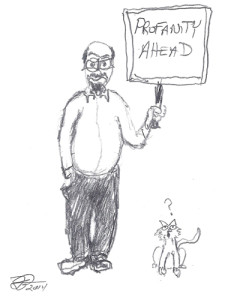 I wrote a long, gentle, touchy-feely introduction to this like five times, trying to be nice and ease into what I wanted to say. The more gentle I tried to be, the longer it got before I said anything. So, I deleted all that, and this is all the intro you get:
I wrote a long, gentle, touchy-feely introduction to this like five times, trying to be nice and ease into what I wanted to say. The more gentle I tried to be, the longer it got before I said anything. So, I deleted all that, and this is all the intro you get:
If you want to be a writer, and you want to make a living with your art instead of doing some shit job that you hate and that has a boss lording over you and an administration telling you what to do while they take all the credit (and money) and you get all the blame … then you need to stop bullshitting yourself.
I have so many writer friends out there who make the most beautiful prose. I’m talking deep thinkers and powerful wordsmiths. People who are hilarious. They post all the time on Facebook about how they hate their teaching job or their office job or their whatever job, and they just wish we lived in a world where artists could make a living “doing what they do.” These folks all lament the same thing, that the world we live in is sort of shallow and doesn’t appreciate artists, that art is relegated to the part time community, the free community, and how that sort of serves as testament to how jacked up things are. Why can’t we make a living doing what we do?
Well, we can. If not full time, then part time for a while and working toward full time. And every time I bring it up, every time I suggest to one of these friends who is miserable in some thankless job (which will become a thankless career if it goes on long enough) that they ought to publish their own shit on Amazon, they all sort of nod and think about maybe … but I really want to do it the right way. The traditional way. The “real” way.
Well that’s awesome. So keep sending your short stories out there to those literary magazines. Keep getting your rejection letters, or, if you win the prize of inclusion for a month, keep getting your ten free copies of the magazine they are distributing to THEIR paying customers (not your paying customers). Keep doing that. Keep hoping that “exposure” is going to … to … to what? Get the attention of the magic book fairy?
There is no goddamn magic book fairy.
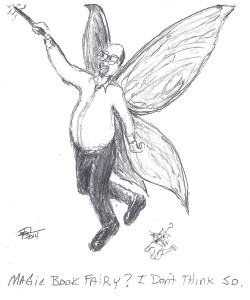 What you are hoping for is that the story you got published in that literary magazine or that newspaper or on that blog somewhere is going to get you noticed. You think it’s going to get you an agent and then, if you can find an agent, then you can get your … uh … well … you can get that novel you have been working on, … uh, well, the novel you started and think about a lot … yeah, you can get that going. Or something. Soon as it happens, you are ready!
What you are hoping for is that the story you got published in that literary magazine or that newspaper or on that blog somewhere is going to get you noticed. You think it’s going to get you an agent and then, if you can find an agent, then you can get your … uh … well … you can get that novel you have been working on, … uh, well, the novel you started and think about a lot … yeah, you can get that going. Or something. Soon as it happens, you are ready!
So yeah. You aren’t doing shit. That is what is happening with your writing career.
And I can say this with conviction not just because I see so many of you doing it, but because that is the same shit I did FOR FUCKING DECADES.
This is where I bring up the whole dreaded, filthy words … self publishing … and everyone’s sphincters start puckering. Good god, send the children out of the room!
Call yourself an “indie” artist instead, you’ll feel better about it. That’s what musicians have done for eons.
I’m not even going to talk about the advent of new technologies that changed the paradigm, and I certainly won’t bring up the outliers like Amanda Hocking, Hugh Howey, Colleen Hoover, Russell Blake, Joe Konrath, E. L. James, etc., because, even though those folks are all indie authors who went mega-millions big, they are outliers. I’m not talking about that kind of wealth. I’m talking just something. An income. A few hundred bucks a month. Maybe even a few thousand if you get four or five or so books out and start building an audience (you can read more about income distribution for indie writers on Hugh Howey’s site). And more importantly, I’m talking about starting a career with your writing, making some money and improving your craft.
“Blech!” you say. “Self publishing is not for me. I don’t do it for money. I’m a purist. I don’t want to sell out my art like that.”
What fucking art?
This whole idea of pure art is such nonsense. Like writing a bodice ripper or a mystery novel is somehow going to bastardize your art. That is such crap.
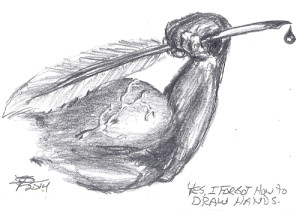 First off, writing is a muscle. Dr. Rice, one of my all time favorite professors, used to say that constantly. You have to work the muscle out. You have to write every day. And how better to write every day than to, well, actually write every day?
First off, writing is a muscle. Dr. Rice, one of my all time favorite professors, used to say that constantly. You have to work the muscle out. You have to write every day. And how better to write every day than to, well, actually write every day?
Real artists bring their art with them wherever they go. They don’t concoct some ridiculous notion that “oh, my art must lead me … I must follow my passions and await the muse and then, alas, when it comes not, I wither in my lonely vacant solitude, an empty vessel, unable to perform until inspiration strikes.”
What fucking poppycock.
You want to write for a living, get off your fucking high-horse. Write a space opera epic, and just do it artistically. Write a romance novel, and make it beautiful. What the hell do you think all of Jane Austen’s books are? You think that’s literature? Yeah, no shit. But you know what else they are? Goddamn romance novels. Every. Last. One. Of. Them.
Edgar Allan Poe and Nathaniel Hawthorn wrote fantasy/ghost/mystery stories. Mark Twain wrote adventure and even fantasy/sci-fi. Jules Verne was sci-fi, hell he invented steampunk. Homer wrote historical fantasy epics with Gods showing up and stuff. What about Gabriel Garcia Marquez, or even more recently David Mitchell who wrote that beautiful Cloud Atlas?
Just because a work of fiction is rendered in a setting that might be considered “genre” doesn’t mean it has to be crap. Genre is what you call it when you list it on Amazon, and it’s how you make your cover art so that people will try the damn thing, as in buy it with money that you can use to pay your rent or at least buy cat food and beer.
More important than sales or money or critical acclaim, at least initially, is that every book you write is going to be practicing your craft: learning plotting; learning character; learning dialogue, not just voice but the physical practice of setting pace and using dialogue tags … all that crap you talked about in writing classes and workshops and get to do in very short, safe doses while writing short stories.
Let me share something with you in terms of practice. This is a list of novels I have written from 2011 to now, in the order I wrote them, word counts, page counts and published or not (and before you think I am bragging, Russell Blake has written 28 books in about that same amount of time):
-
- The Galactic Mage (158,699 words – 518 pages – published)
- Fish Story (91,199 words – 309 pages – not published yet)
- Rift in the Races (256,518 words – 921 pages – published)
- Hostiles (176,887 words – 613 pages – published)
- Ilbei Spadebreaker #1 (132,273 – 450 pages – published)
- Alien Arrivals (157,495 – 544 pages – published … out in 2 weeks)
- Alien Interests (115,026 – 422 pages – not published yet, end of summer or early fall)
That is 3,777 pages and one million one-hundred and fifty thousand words (1,088,097 words).
Whether you like my books or not, whether any of them are any good or not, that is how much practice I have gotten in the last three years. That’s not just writing; it’s rewriting, revising, revising again and again and again, having editors and beta readers look at them and comment and critique, revising more, learning from hundreds of reader reviews on Amazon (which can hurt, but, we are writers and we need tough skin) … it’s ALL of that.
How much practice have you gotten? How is your writing muscle?
Does your writing workout consist of a couple of 5,000 word short stories now and again? Great. That is great. Seriously. But, I mean, remember: this conversation started because people keep complaining about their day jobs and the fact that they can’t make a living with their art.
Yeah, you can’t make a living off of 5,000 word short stories that you write three or four times a year. You can’t. I totally agree.
And that is why there is so much bad writing out there that does sell. Because people like you, people who have the real talent and the real skill, AREN’T WRITING ANYTHING FOR PEOPLE TO BUY. It’s like some people are just too cool to sully their work sharing it with the unwashed masses directly (so they tell themselves), so other people, mere mortals, are the ones producing books and earning some kind of income, full or part time.
So, keep complaining if you want to. Keep sending stuff out and hoping for approval in the lottery-game of a traditional publishing model that doesn’t take on very many new authors. They don’t. They can’t. Not right now. They still do take some, it’s true. And I’m not here to bag on them. That is an inroad to a writing career too. My point is not to say that the traditional path to a writing career is a bad one. My point is to say that it is a statistically unlikely one in terms of making a living or augmenting your living now, in this moment in time while you are, you know, actually alive.
Going the indie road is a proven tactic. Go read that Hugh Howey piece I linked above. Look at what can happen if you skip the middleman and allow yourself to collect money on your stories rather than dust. It is not only possible, it is in YOUR control rather than in the control of fate, luck, slushpile interns, acquisition editors and magical book fairies. You can take control of your own destiny. More and more people are not allowing themselves the false safety net that says, “I don’t want to whore out my art.” That is an excuse to not face fear of failure (or fear of success). Or fear of the fact that you have just been bullshitting yourself.
Write a goddamn novel. Finish it. Consider writing it in a genre that might get you paid, even if only enough to buy lunch and a beer. Start somewhere, but write. Write something deeply literary if you have to. But write it. Commit to a 1000 words a day if you have a day job. You can do that in an hour or two. Practice your writing. Build up your muscles. Do it, finish it, clean it up, put it out.
And start on the next one.
At least you will be learning something. Do you really want to wait until you land that magic book fairy contract to start practicing on your real novels? Like, as in, start practicing how to actually finish one? You’re going to start figuring that whole thing out after you find an agent or a publisher?
So write it now. Put it out. Build an audience. Grow your skill set. Learn stuff about the process that you can’t possibly learn without, well, going through the process. And that starts with actually finishing one.
Maybe, with an audience, and a stack of novels that hones your skills, you will get that traditional contract you’ve always wanted. You can lure the magic book fairy to you with your success. But if she doesn’t come right away, you might still be getting paid.
And here’s the real reward. You can have the real joy of art: creation that connects you to other people … to humanity, to whatever you want to call it. Art isn’t a one way thing.
Come on all you Lit. majors … all you people who loved critical essays and dissecting texts … what was the real lesson in all of those exercises?
It wasn’t whether this critic or that one was right or wrong, or that anyone figured out what this author or that actually meant. It was the magic of two minds connecting: the writer and the reader. It was this sort of telepathy that bridges time. Bridges culture, age, ethnicity, gender and identity. Guess what … you can’t really do that alone. You, the writer, need the reader too. That’s the only way to complete the circle.
Stop bullshitting yourself. Stop deluding yourself that you are “an artist” that is too good to go schlep books on the corner. If Mark Twain and Ben Franklin weren’t too good for it, neither are you. The truth is, you aren’t doing the work. That whole “I’m not inspired” thing is garbage. You will find your inspiration in the thing you wrote, the FINISHED thing. The inspiration is in the work. Get to the end, then revise. Stop sending three chapters to your friends. Stop revising the first three chapters over and over and over again. What the hell are you revising if you don’t even know where the hell those three chapters are leading to. The odds are, when you finish the first draft, all the way, you’re going to throw those three chapters out anyway. So shut your face, stop needing approval, stop … just being so damn needy. Just do it for Pete’s sake.
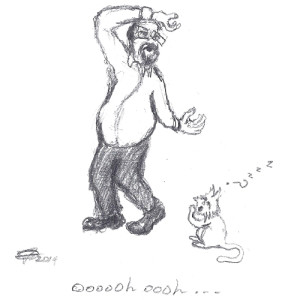 The muses feed the writers that work, not the ones with the backs of their hands lying limp upon their brows as they sigh mournfully into an uninspired wind.
The muses feed the writers that work, not the ones with the backs of their hands lying limp upon their brows as they sigh mournfully into an uninspired wind.
Fuck that.
And I want to help. I want to show how totally doable this is. And yes, there are lots of other blogs and books out there that already do this. But this is for my friends who might, maybe listen, since they know me. They might take a chance, and risk falling down at first. I’ll help. I’ll share whatever I know … which isn’t everything, but it’s something.
I’m going to follow this post up with a series of “how to” posts that talk about ways to get started. I’ll hit how to construct a novel idea from nothing; I’ll hit outlining in big picture and chapter-by-chapter detail; and I’ll hit some other stuff, maybe even go into cover art and marketing if anyone is interested. If not, I’ll just amuse myself. But I will try to cover how to make a novel happen, including doing so for people who “just don’t have any ideas.” That’s bullshit too, and I can get you over that excuse too.
Now I know that jumping from short stories to novels is hard, but the truth is, short stories don’t make money. They don’t. And yes, you can go and find the example of one, or of some collection that does and “prove me wrong.” Congratulations, now go back to statistics class and try again. But novels are where the full-time and part-time writing careers are. Which is, for those of you who hate your day jobs, what you need to make a living or at least improve your living with your writing … and your art. It will also increase your chances of getting an agent and a traditional publishing contract, if not by sales volume, but the fact that you will have all that practice improving your craft.
I’m only saying any of this because I had to be forty-five before I finally pulled my head out of my ass and started doing what I love, like as in actually doing it. The whole thing about “doing what we do” is that you still have to, you know, DO it. I know so many amazing people still in their twenties and early thirties that could spare themselves a decade or two of the same stupid, vain, weak-ass, stubborn crap I went through, finding excuses for why I didn’t have time, or didn’t have an idea or didn’t whatever. It’s all crap. Start now. The sooner you start, the sooner it starts happening. Do the work, make your own luck. Get your 10,000 Malcom-Gladwell Outliers hours in. Just start. Something good will come.

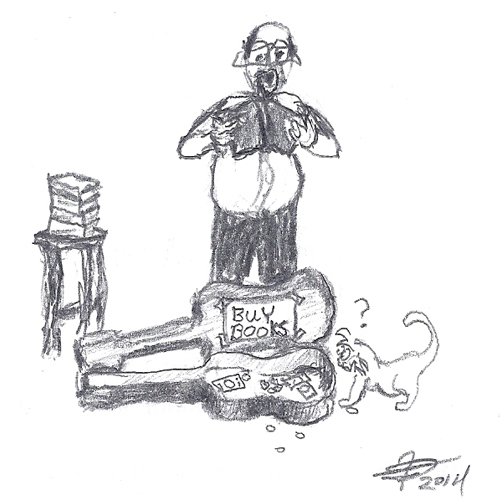
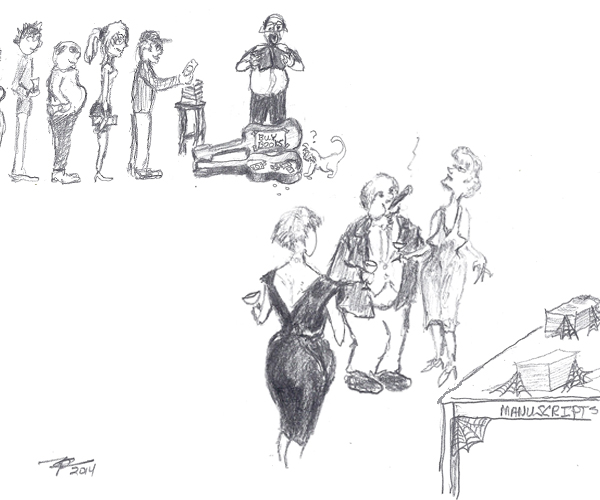
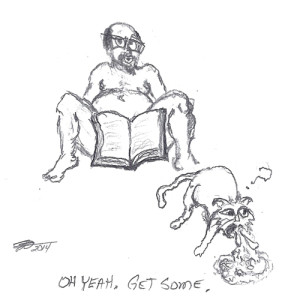
I can totally relate to this.
A published author several years ago told me to send a short story to a literary zine where he would put in a good word for me. But as I was sitting down to write that short story, a novel insisted that I write it, and so I did, and the rest is history.
Dear John,
I love this post! It kept me riveted from beginning to end, which is rare with a long post. Not only are you right, you have a way of putting it into words that surely ought to whack a few folks upside the head to go after their dreams. I did what you did, and let decades slip away before I started following my heart. So many years gone, working for The Man, when always they should have been spent writing. Thank you for putting it so eloquently, because eloquence isn’t about fancy wording… it’s about touching the heart and the mind, and you did both.
–Allie Mars aka Sharon Delarose
John is spot on, and is quite unselfish in his sharing of the model for his success.
I wrote a detailed testimonial of this blog entry but found myself repeating what he had already said. so I erased it. I will say this:
Listen to what he has so graciously offered as advice. I am doing basically everything he has mentioned and in the last eighteen months I have two published novels, am nearing the completion of my third and am making more than beer and cat food money 🙂
Thanks John for the advice and example. Karma goes round. I always share your books and blog.
Rick
I read it and I like your pictures. I do hate work, am very lazy and consider myself to be an undiscovered genius. I may write FIFTY words today and see how it goes.
Thanks, humble servant, etc.
Good advice John! I was thinking of Poe and Dickens when I read this. They wrote serial fiction for the great unwashed masses (as did Shakespeare with his plays) and no one would call them ‘sell-outs’ today. Vonnegut wrote for money. So did Lovecraft. I’m pretty lazy though. I don’t consider myself an artist or a great thinker, I’m just Pam. I’m with Ewbie. Might try writing 50 words a day. But first… a power nap. 🙂
You make many salient points that a crowd of people should follow and use. In fact, you bring to mind Harlan Ellison’ s views, which he launches with double the profanity. I am relieved that someone will carry on giving strong writing advice after he is gone.
A good kick up the behind for all the days I think about writing or make excuses rather than do it. All too easy to let it slide and the weeks can just slip away. I’ve only got about 10,000 words to finish the first draft of my third novel but have been putting it off since Christmas. Time that I can never get back.